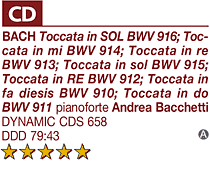July-August 2010
CDs 5 stars of the month
CDs 5 stars of the month
 A few months after the double CD of Inventions and Sinfonias, Andrea Bacchetti's adventure into
Bach repertoire becomes richer with a new chapter dedicated to Toccatas.
A few months after the double CD of Inventions and Sinfonias, Andrea Bacchetti's adventure into
Bach repertoire becomes richer with a new chapter dedicated to Toccatas.These are pages of early life, a few times recorded and performed as all works that don't show the fire of Bach's virtuosity, Toccatas ask for a meticulous and controlled interpreter who can give the nuances without stress them to much on the expressive plan and on the one of virtuosity. As a consummate Bach interpreter, the thirty-years-old Genoese pianist shows to be suited to the task, giving to the listener some dry and very effective lectures.
Clear and linear the movements as a Concert (for example the opening one of Toccata BWV 916), incisive the fugues, delicate the slow movements; in the last ones, it's possible to breath the sweetness already seen in the Inventions
and Sinfonias' interpretation (MUSICA, n.213) and a melancholic note which makes the expressive palette of the Genoese pianist richer. For example, the Toccata BWV 914: the rambling and improvisational character of the short Prelude is all impressed in free phrasing, although never exceeding, while the double Fugue for four voices that follows it is realized with great rigor but without rhythmic rigidities, like the final Fugue for three voices. The Adagio, instead, is sweet and dreaming. With a sound that is always perfectly calibrated, the easy and natural cuts in time are the signature of an interpretation in which logic and poety of pure counterpoint come out to light. Sometimes, the musical texture is animated by a intriguing and light mobility, like in the final Fugue of Toccata BWV 915, but in the end these interpretations are always measured. There's not the lightness that missed in double CD with Sinfonias, Inventions and Second Partita yet, but in this case it isn't a limit, because pages so limpid and linear - as Toccatas are - couldn't stand so openly virtuoso interpretations, with a too rapid rhythm. There's to appreciate also the fineness with
which Bacchetti renders the fragile trims of improvisational character of preludes that are animated by minimal rhythmic differences in a climate of gathering melancholy.
Luca Segalla


remarks the exceptional records reviewed in this number